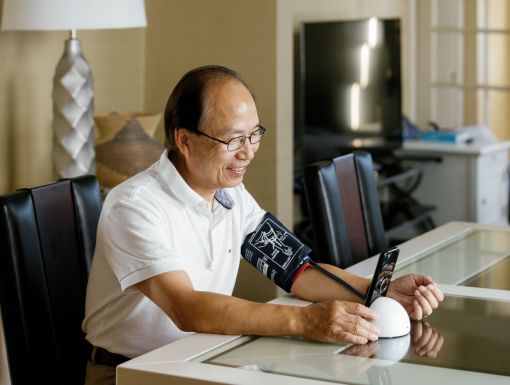
Perimenopause and Blood Pressure: What Women Should Know
Perimenopause is a natural stage in a woman's life that begins the transition from reproductive years to menopause. It is characterized by hormonal changes that generally occur between the ages of the mid-40s and mid-50s and can start up to 10 years before menopause. Perimenopause differs from menopause, as menopause is one full year with no period. The average age of menopause for women in the United States is 51 years old.
Perimenopause is normal, but it can cause health concerns, like being at an increased risk of high blood pressure, also called “hypertension.” High blood pressure is a common long-term condition that can lead to serious health complications if left unmanaged.
Women should take extra care with their heart health during perimenopause. Ochsner is committed to helping women navigate this critical phase of life with expert care and guidance. The Ochsner Digital Medicine program offers simple digital tools and remote support to manage blood pressure during this transitional phase.
What is perimenopause?
Perimenopause is a natural life stage that leads up to menopause. During this time, hormonal changes can cause a variety of symptoms, like irregular menstrual cycles.
Women may experience periods that are shorter, longer, heavier, lighter or skipped. Other common symptoms include vaginal dryness, hot flashes, night sweats, mood swings, fatigue and sleep disturbances. These symptoms happen due to changing hormone levels, particularly estrogen and progesterone.
These hormonal changes can affect various aspects of a woman's health, including blood pressure. Estrogen has a protective effect on blood vessels, helping to keep them flexible and functioning properly. But as estrogen levels decline during perimenopause, blood vessels may become stiffer and less responsive, leading to increased blood pressure.
Women going through perimenopause should monitor their blood pressure regularly and make lifestyle changes to manage high blood pressure, if needed. This may mean eating a healthy diet, regularly exercising, reducing stress and taking medicine if a doctor suggests it.
Risk factors
Research indicates that about 17% of women experience higher blood pressure during perimenopause.
Risk factors include age, family history, obesity, inactive lifestyle, poor diet, smoking and drinking too much alcohol.
Understanding high blood pressure
High blood pressure is a common condition that affects millions of people. It means that blood pressure stays high in the arteries, which can lead to various health problems if not managed.
Consistently high blood pressure puts extra strain on the arteries and organs throughout the body. Over time, this can damage to the blood vessels, heart, kidneys and other vital organs. Without treatment, it increases the risk of serious health conditions like heart disease, stroke, kidney disease and even dementia.
Controlling blood pressure is important to stay healthy and reduce the risk of complications. If you have symptoms of high blood pressure, or are worried about your blood pressure levels, talk to your doctor about it. They can diagnose you and create a personalized treatment plan to manage your high blood pressure best.
How can you manage high blood pressure?
Various lifestyle changes and medical treatments can prevent or control high blood pressure.
One of the most important steps is to maintain a healthy weight. Extra weight puts strain on the heart and blood vessels, raising the risk. Regular physical activity, such as brisk walking, swimming or cycling, helps manage weight and improve cardiovascular health.
Eating a heart-healthy diet is also important. Foods like fruits, vegetables, whole grains, lean proteins and low-fat dairy can help lower blood pressure. Limit salt, unhealthy (saturated) fats and added sugars. Drinking less alcohol and quitting smoking can also have a positive impact on blood pressure levels.
Stress can raise blood pressure, so try finding healthy ways to cope, such as practicing relaxation techniques or engaging in hobbies.
Medical interventions and medications are also available to manage high blood pressure. Your doctor may prescribe antihypertensive medications, which work by relaxing blood vessels, reducing the workload on the heart or decreasing fluid levels in the body. Follow your doctor's instructions for medication usage and dosage.
Checking blood pressure regularly is important for people with high blood pressure. The Ochsner Digital Medicine program supplies an easy-to-use blood pressure cuff that allows members to check their blood pressure levels from home, which are often more accurate (and frequent) than those taken in a clinic. These readings are also sent to the member’s Digital Medicine care team, who will monitor them to make treatment decisions. The Digital Medicine app connects to the member’s medical record to give them an overall snapshot of their blood pressure trends.
Heart health in perimenopause
Perimenopause is a natural, transitional phase that occurs in a woman's life before menopause. Understanding the relationship between perimenopause and heart health can help women prevent heart disease.
Learning about hormonal changes, taking steps to prevent problems and living a heart-healthy lifestyle can help women stay healthy through perimenopause.
If you have been diagnosed with high blood pressure, treatment options depend on your individual needs. Ochsner Digital Medicine offers expert guidance and remote patient management technology to track and effectively manage your condition.
For eligible members, this clinically proven program offers:
- A blood pressure cuff that automatically sends readings via their smartphone or tablet to their electronic health record.
- A licensed clinician who monitors readings and can adjust medications as needed.
- A panel of health coaches who help the enrolled member take manageable steps toward a healthier lifestyle.
- Ongoing monthly progress reports, support tools and educational resources that help them stay on track.
The Digital Medicine program meets their members where they are to empower them to lead their own health journey. This program is an at-home or on-the-go management system, so no extra trips to the doctor’s office are needed.
Digital Medicine can also help with Type 2 diabetes, cholesterol and weight management.
Ensure controlled blood pressure during perimenopause with Ochsner Digital Medicine.



